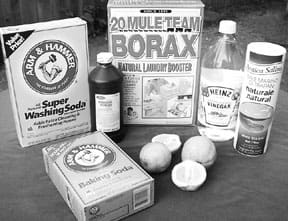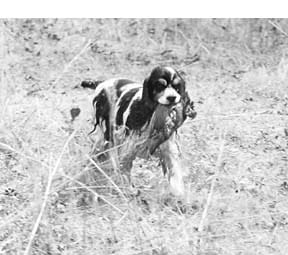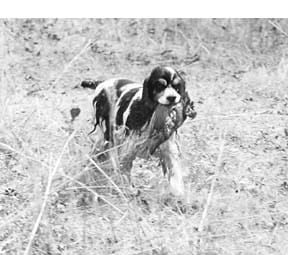Like many of the people who use non-traditional treatment modalities for their dogs, Richard Beaton and Sue Kelly never planned on calling anyone but their regular veterinarian when their dog Titan first hurt his back. And if Titan, a purebred American Cocker (also known as Bryant’s Triumphant Escapade CDX,JH,SH,WDX,CGC,TT), wasn’t in the midst of an obedience career when he began having gait problems associated with his injury, his owners may have been content with heeding their regular veterinarian’s advice for treating Titan.
But “rest and muscle relaxants” didn’t seem to be getting Titan any better, and the couple couldn’t stand to see their darling in so much discomfort. So, like so many dog owners before them, they asked their friends for advice, and when an acquaintance suggested that they contact a veterinarian who uses chiropractic and acupuncture, they were desperate enough to help Titan that they overcame their initial hesitation and made an appointment with the recommended practitioner, Dr. Michelle Tilghman of the Loving Touch Animal Center in Stone Mountain, Georgia.
What they saw in Dr. Tilghman’s treatment room made them instant converts to chiropractic and acupuncture, and opened their minds to alternative healing modalities.

“Dr. Tilghman spotted the same problem the other vet had seen, but instead of saying, ‘Go home and rest him,’ she adjusted his back, and it was like night and day,” describes Sue Kelly. “We couldn’t believe the difference. Titan limped into the office, and screamed out in pain if he turned his neck a certain way, but after just one adjustment and an acupuncture treatment, he was better. He could turn and bend and jump again.”
A special bond
But let’s begin at the beginning. Graced with an exceptionally pretty face and symmetrical markings, a lush tri-colored coat, and an energetic constitution, Titan also had a certain something that made him stand out from his litter mates. A breeder friend of the couple were aware they were looking for a puppy to raise and show in conformation, and she called the couple on the day Titan was born; they drove over to see the puppies that very day. Says Sue, “We just fell in love with him immediately. He was a really cute puppy.”
Unfortunately, by the time Sue started Titan in conformation classes, she discovered that Titan was missing a tooth, a small but important fact that would limit his success in that particular type of competition. By that time, however, the couple was so in love with the loving little dog that they never allowed themselves to be disappointed. Instead, by the time he was nine months old, Sue started him in obedience. He earned a Companion Dog title a little over a year later.
Sue continued to train Titan for American Kennel Club-sanctioned obedience classes. It was when he training and showing for his Companion Dog Excellent title, when he was around four years of age, that Titan hurt his back. “There is a lot of jumping involved in getting the CDX title,” explains Sue. “And somewhere in that time, he hurt himself.”
Sue says that if she knew then what she knows now about gait problems, she would have instantly recognized Titan’s symptoms as a back problem. But at the time, the first sign she had that all was not well was that game little Titan suddenly began refusing to jump his jumps. “Titan had always so enjoyed running, jumping, retrieving, that when he refused to jump, I knew something was wrong, but I didn’t know what,” Sue recalls. Titan would run up to the jump and then stand there shaking, looking from the obstacle to Sue as if to say, “Sorry, I just can’t do it.”
Shortly after Titan’s reluctance to jump surfaced, his gaits began deteriorating. His stride was shorter. A couple of times, Titan would suddenly yelp with pain when he looked over his shoulder in a certain direction. After a bad episode at the Cocker Nationals show, the couple brought him to their veterinarian, who identified a pinched nerve in his neck and a pulled muscle in his right hind leg.
However, the veterinarian had nothing but rest and muscle relaxants to relieve Titan’s distress. Instead, just a couple of chiropractic adjustments got Titan back into the show ring.

The person responsible for Titan’s return to soundness gives a lot of the credit back to Titan’s owners. “They are really great owners; they realized that when their dog quit jumping, he was telling them something was wrong,” says Dr. Tilghman. “They didn’t immediately jump to the wrong conclusion, and blame it on ‘disobedience.’ You have to think of this every time you’re looking at your dogs and they are not doing what they are supposed to be doing.”
While Titan was returned to soundness with just a couple of chiropractic adjustments and some acupuncture treatments, he was still reluctant to try jumping. “He seemed terrified to try it again,” says Sue. When she reported this to Dr. Tilghman, the veterinarian recommended that Sue give Titan some “Rescue Remedy,” a Bach Flower Essence remedy available in most health food stores. Flower Essence therapy can often be a big help with emotional problems in dogs, people, and other animals.
“That did it,” laughs Sue. “That was the last time I ever doubted these alternative treatments. I gave Titan one dose of Rescue Remedy one time, and he jumped his first jump again that day. He was never afraid to jump again. That made a believer out of me!” (Sue now brings Rescue Remedy with her to all her dogs’ competitions, to help them with the stress of showing and travel.)
Periodic adjustments
Because the couple went on to pursue several other athletic endeavors with Titan, and because the plucky dog throws himself so thoroughly into his work, it shouldn’t be surprising that, from time to time, his back trouble recurred. While a chiropractic adjustment and acupuncture put him right again every time it happened, Dr. Tilghman realized she needed to do something to help prevent the stresses and strains that contributed to Titan’s back problems.
As a self-described “weekend athlete” and former athletic competitor, Tilghman knew that warming up, stretching, and cooling down are critical to an athlete’s health and longevity.
“If we don’t treat our dogs like athletes, they aren’t athletes very long,” says Tilghman. “I work out all the time, and I know terrible it feels to exercise without warming up or stretching or cooling down. So, using Titan as a guinea pig, I developed a pre- and post-exercise program – really, a sportsmedicine program not unlike those developed for athletes – to help keep him healthy.”
First, Dr. Tilghman instructed Titan’s owners to take him on a walk before any training or show ring efforts, in order to warm up his muscles, joints, and ligaments. Next, she showed Richard and Sue how to slowly and carefully stretch his legs, moving each limb through the range of motion. The hind-limb stretches, especially, help to pull out the hip flexor muscles and stretch his back. Then he is ready to perform.

That’s not the end of the program, however. “Can you imagine running a race and not cooling down?” asks Dr. Tilghman. Anyone who has ever run a few miles and then sat down for a while without stretching or cooling down knows the dire effects this can have on your body. “Just like plunking down on the couch after a run will make you hurt, putting a hot dog in a cool crate will yield one sore pup,” says the veterinarian. “The lactic-acid build-up can not only damage muscles, it can make you feel sick and exhausted. You literally poison yourself when you do this, and poison your dog when you make him do it.”
So, after each of Titan’s workouts, the couple makes sure they take him on another slow-paced walk, giving him an opportunity to cool down before putting him away.
Graciously, Dr. Tilghman credits Titan as the inspiration for a preventive care program that she suggests to all of her clients that own athletic or competitive dogs. She has found that these simple considerations help poorly built dogs perform beyond their natural ability. “It’s true; I’ve seen many dogs with so-so conformation perform competitively against dogs that are conformationally superior, just because the poorly built dog felt better, and had better back health,” she says.
This kind of sportsmedicine program also helps keep dogs healthier longer. “It’s preventive care, and it helps extend their careers,” the veterinarian says.
Active to the last
The program certainly has helped Titan stay competitive and strong, ready to give any pastime a try. When the couple developed an interest in hunting, they took Titan (then aged five years) out with some friends to see what he would do around birds and guns. The first time a bird was shot in his presence, he was the first dog to get to it, retrieving the chukar and proudly returning it to his amazed owners. Not long after, Richard showed Titan to a Junior Hunting field title, and a year later, a Senior Hunting title.
Titan has, more or less, been in continuous training for something or other his whole life. As time went by, Titan also earned titles as a Working Dog Excellent, Canine Good Citizen, and, of course, passed the AKC Temperament Test.
When Titan was 10, Sue even took him to some Utility competitions, where the dog has to seek scented articles handled by the trainer, and perform directed jumping, among other complicated tasks. She reports that while Titan loved the showing part, he didn’t seem to enjoy the practicing and training at home. So, at the age of 11, she let Titan “retire” from the show ring, though she still uses Titan for a demonstration dog in her obedience classes, a task she says he loves more than anything he’s ever done. “He’s a natural ham,” she laughs. “He always has been, and I think he will be until the day he dies. He loves it when I take him to class and people watch him.”
Even though she hasn’t had an opportunity to see Titan in the show ring or in the field, Dr. Tilghman has also enjoyed “watching” Titan’s career. She can’t say that about many of the dogs she has observed in the ring. “If I was ever a dog show judge, half of the dogs would be thrown out; so many of them are lame, but no one seems to notice,” she says. Being part of Titan’s team has been an altogether different experience. “It’s a real joy sending a dog into the ring that you know is sound, healthy, and fit,” she says, and clearly his owners agree.
-By Susan Eskew
Susan Eskew, a freelance writer from Crested Butte, Colorado, is a frequent contributor to WDJ.






